In the Golden Age, the bounty, abundance, wealth, beauty, arts, and improvements will mark every instant of life. People will always meet beauty and, like the moral excellence they display, the places in which they live, as well as their gardens, home decorations, clothes, music, entertainment, artworks, paintings, and conversations, will become more beautiful. Consequently, people will experience all of the beauties that Allah mentions in the Qur'an. In one verse, Allah states that the faithful believers will be given a beautiful life in this world:
What is with you runs out, but what is with Allah goes on forever. Those who were steadfast will be recompensed according to the best of what they did. Anyone who acts rightly, male or female, being a believer, We will give them a good life and recompense them according to the best of what they did. (Surat al-Nahl: 96-97)
The Qur'an calls attention to the fact that the environment of those who abide by Allah's commands will be transformed into a kind of "Abode of Peace." Allah also gives the good news that He will reward people for their fine morality, and give a better life in this world and an infinite life in the Hereafter.
Allah calls to the Abode of Peace and guides whom He wills to a straight path. Those who do good will have the best and more! Neither dust nor debasement will darken their faces. They are the Companions of Paradise, remaining in it timelessly, forever. (Surah Yunus: 25-26)
We can imagine the daily life, arts, economy, and social life that will exist in the Golden Age, for the Qur'an prescribes an understanding that comprises every instant of life. This understanding is based on doing good works that will find favor in Allah's sight, and adopting the best, most accurate, and rational conduct. This Qur'anic understanding and the wisdom it offers will cause a heretofore unprecedented and superior understanding of arts to flourish.
In our day, the majority of people involved in different branches of the arts consider art as a materialistic profession that will earn them fame and a high standard of living. Most of the time, they make art not for art's sake but for money. Their sense of art is driven by a concern for profit or fame rather than following their own inspiration. For this reason, they undertake no serious effort and feel no need to expand their horizons to produce novel works of art, for they only desire immediate material returns. However, the telling attribute of an artist is his or her ability to think freely and deeply, and thereby produce unique works.
Meanwhile, even if an artist is committed to produce quality works and succeeds in doing so, those responsible for the business part of this undertaking fail to support his or her endeavor, for such works may not be profitable in the prevailing market conditions. In our day, instead of appreciating a work's artistry, meaning, aesthetics, and quality, many art galleries present productions that lack taste, artistry, quality, and meaning.
The Golden Age will eliminate such views, for material concerns that corrupt artistic values will disappear when everyone receives their share from the prevailing abundance and welfare. This free state of mind will allow artists to devote all their attention to displaying their talents in a peaceful atmosphere. People will realize that art is a divine beauty, and finally will give all types of art their due attention. Inspired by the beauties that they see in Allah's creation, artists will produce remarkable works. The Qur'an's values and the wealth of senses that these values bring will generate in people the will to produce ingenious works.
Another reason for this flourishing of the arts will be the abandonment of any tendency to portray hideousness, which is a popular tendency today. The penetration of nihilist and pessimistic beliefs into society, along with the prevalence of materialist philosophy, accounts for this tendency. Hideousness is valued, and productions introduced under the guise of art cause people to drift toward pessimism, tension, and depression. The themes of such art is often death, pain, hate, loneliness, purposelessness, and meaninglessness. This situation is a natural consequence of the chaos and destruction inflicted by unbelief on the human soul. In the End Times, all of these psychological disorders will disappear, and humanity will experience the joy, happiness, and security brought about by the Qur'an's values. This will, in turn, transform the arts into an endeavor that depict beauty rather than hideousness.
Recognizing the subtleties, taking pleasure in them, and presenting them to others in a form that causes delight underlies the essence of the arts. These features owe their existence to the Qur'an's values. In the Qur'an, Allah commands people to examine every thing, ponder over it, and see the divine purposes behind all events. One of the verses by which Allah summons people to ponder is as follows:
Have they not looked at the sky above them: how We structured it and made it beautiful and how there are no fissures in it? And the land: how We stretched it out and cast firmly embedded mountains onto it and caused luxuriant plants of every kind to grow in it, an instruction and a reminder for every devotee turning to Allah. And We sent down blessed water from the sky and made gardens grow by it and grain for harvesting and soaring date-palms with layered spathes. (Surah Qaf: 6-10)
Everything stated in this verse is encountered frequently by people in their daily lives. However, only the believers who strive to see the divine purposes in these things can see the beauty in them. A strawberry's color, a rose's odor, a banana's flawless packaging, the heavens adorned with stars—all of these mean a lot to the faithful. Art is one way to express these beauties and then interpret and incorporate them effectively into our daily lives. Various branches of art, such as painting, music, or decoration, convey the joy inspired by such beauties to the human soul.
In the Golden Age, every living thing and each incident will stir great joy in people's hearts and, accordingly, manifest itself in artworks, city planning, construction, landscaping, and so on. Artists who see the world through the outlook endowed by the Qur'an's teachings will amaze the world with their masterpieces. Their innovative works will be unique and invigorate people's lives.
The Qur'an provides a detailed account about aesthetics. Prophet Sulayman (as), who had a superior understanding of art, is a good example of the Muslims' aesthetic understanding. From the Qur'anic accounts, we understand that art, aesthetics, and beauty pervaded Prophet Sulayman (as)'s palace. Its floor, which was the first thing to catch people's attention, gave the impression of water, for it was made of glass. The sight of such a transparent floor appeals to the human soul and gives relief. It is also exciting, since it is unique. Indeed, the impact of the palace's splendor on the Queen of Saba is related in the Qur'an as follows:
But what she worshipped besides Allah impeded her. She was from an unbelieving people. She was told: "Enter the courtyard." But when she saw it, she supposed it to be a pool and bared her legs. He said: "It is a courtyard paved with glass." She said: "My Lord, I have wronged myself, but I have submitted with Sulayman to the Lord of all the worlds." (Surat an-Naml: 43-44)
The Qur'an provides further details about Prophet Sulayman (as)'s life. One verse calls our attention to why he enjoyed wealth, power, and magnificence, which are blessings from Allah:
And he said: "Truly do I love the love of good, with a view to the glory of my Lord." (Surah Sad: 32)
Another verse informs us that he made his people produce various works of art:
They made for him anything that he wished: high arches and statues, huge dishes like cisterns, great built-in cooking vats. "Work, family of Dawud, in thankfulness!" But very few of My servants are thankful. (Surah Saba: 13)
These works of art convey his elegant understanding of art. Today, only one wall of this temple known as Solomon'sTemple in Jerusalem remains, but as the Qur'an and historical documents and accounts reveal, it was once a magnificent palace. In the Qur'an, Allah commands Muslims to take lessons from the Prophets' lives and moral excellence. In this sense, what the Qur'an tells us about Prophet Sulayman (as) is very precious, for it exemplifies the kind of innovations Muslims can make in art and aesthetics, and how they can embellish Earth with superb works of art. In the Golden Age, there will be people who adhere to the Qur'an and, in compliance with Allah's commands, take lessons from its accounts of the Prophets' lives. In this sense also, the Golden Age will have parallels with Prophet Sulayman's (as) period.
The Qur'an gives a detailed account of such a society's life. Those who comply with the Qur'an's commands can readily recognize the right and beautiful and eliminate what is undesirable, since they are guided by their conscience and reason. Consequently, those who have based their morality on the Qur'an's teachings will render invaluable services in the arts, music, theatre, and literature.
As the above examples suggest, Allah provides all believers with the understanding of aesthetics, art, and beauty, both in Paradise and in daily life. In the Qur'anic sense, art cannot be confined to music, literature, and painting, for art fills every field of life with its own vigor. Believers display their understanding of the arts in a number of ways; speaking beautifully, being witty and humorous, being able to use the tone of voice in a fine manner, having a taste for clothes, home decoration, landscaping, cooking tasteful dishes that also look pleasing to the eye, preparing aesthetic tables, showing affection and love, sincerely expressing the affection felt for children, for instance, or likewise, displaying respect and love to an elderly person or hosting visitors.
The Golden Age will be a period when people will strive to engage in art and present beauty to other people with their works of art, looks, conversations, and conduct.
People need to broaden their horizons in order to understand the Golden Age's superior and unique arts. Most contemporary works of art either lack creative power or are imitations, for most people make no effort to think and produce new ideas. Meanwhile, any novelty is imitated and thus quickly loses its originality.
Monotony also manifests itself in music-making. For instance, a song's performance is limited to certain instruments, while a musical work may have many variations. Being resistant to true innovation, narrow-mindedness and competition underlie this lack of ingenuity. People tend to imitate popular works, since they prefer fame and material gain over aesthetic values. For this reason, despite belonging to different genres, the identical rhythms, melodies, and lyrics are repeated.
This is also why innovative theater plays are not produced. For centuries, the same plays are repeated with minor alterations. The characters' conversations, answers and behaviors become so similar that a regular theater-goer almost knows them by heart. The actors' actions, voices of tone, style, and way of addressing are far from natural.
However, in the Golden Age, everyone will learn how to take pleasure from the surrounding beauties and will strive for perfection. Its welfare will enable artists to produce amazing works of art. In music and other branches of art, various and unique works will be produced. Perfectly original video clips and forms of entertainment will make every instant of life more enjoyable and vivid.
Some contemporary artists produce fine works of art. But due to the reasons mentioned above, they are few in number and thus their works are accessible to only a mere handful of people. In the Golden Age, however, these works will be available to the public.
These are only a few of the Golden Age's unique advances. In an environment where people comply strictly with the Qur'an's commands, the believers' lives will become perfect. In the following verse, Allah informs us that the only reason why people remain deprived of blessings is unbelief:
Were it not that mankind might all become one community, We would have given those who reject the All-Merciful silver roofs to their houses, silver stairways to ascend, silver doors to their houses, silver couches on which to recline, and gold ornaments. (Surat az-Zukhruf: 33-35)
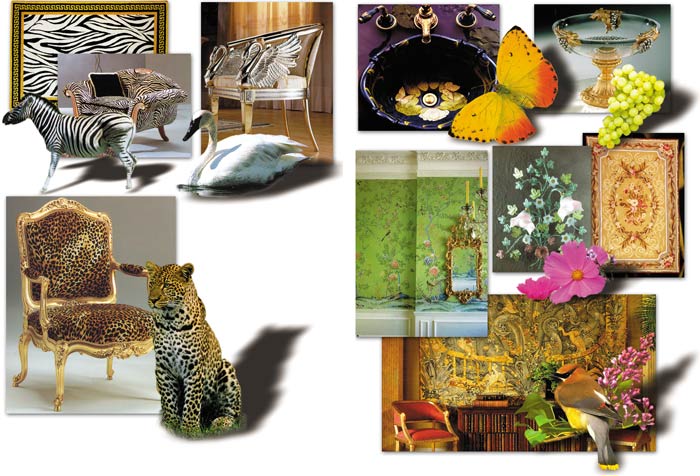 |
Each sample of Allah's unique creation is an inspiration for all branches of art. The beauty of a grape, the matchless color and harmony of a butterfly's wings, the elegance of a swan, the beauty of color and texture of a flower, or the perfect harmony of a zebra's skin or leopard's fur are only a few of these. Art is one of the ways to express, interpret, and incorporate these beauties into our daily lives. Various branches of art, such as painting, music, or decoration, convey the joy that these beauties inspire in the human soul. |
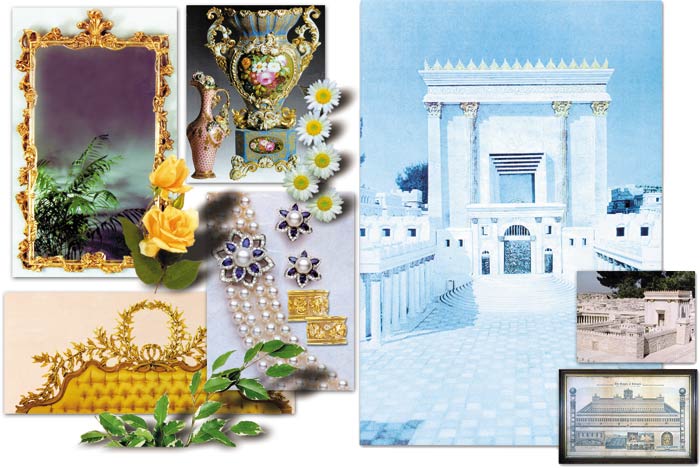 |
Illustrations of Prophet Sulayman's (as) magnificent palace. |
They will enter Gardens of Eden, where they will be adorned with gold bracelets and pearls, and where their clothing will be of silk. (Surah Fatir: 33) She was told: "Enter the courtyard." But when she saw it, she supposed it to be a pool and bared her legs. He said: "It is a courtyard paved with glass." She said: "My Lord, I have wronged myself, but I have submitted with Sulayman to the Lord of all the worlds." (Surat an-Naml: 44) |
In the Qur'an, Allah informs us that the believers' real abode is Paradise. Consequently, the aesthetic understanding of a person who lives by the Qur'an's morality is also shaped according to Paradise's standards. As their real home is Paradise, the way for the believers to beautify this world is to turn it into a place that reminds them of Paradise.
The believers' longing for Paradise urges them to transform their surroundings into Paradise-like places. Paradise, no doubt, abounds with works of art beyond our imagination. It is a place of images and beauties of such perfection that they are unlikely to be attained in this world. Still, the Qur'an's outlook urges us to use all of Earth's available resources to turn our planet into an image of Paradise.
First of all, the believers manifest the Qur'anic understanding of cleanliness in their immediate surroundings. In the Golden Age, all places (e.g., highways, places of worship, recreational places, workplaces, and houses) will be very clean. In one verse, Allah commands them to "purify your clothes. Shun all filth." (Surat al-Muddathtir: 4-5) In compliance with this verse, their clothes will be perfectly clean and the necessary cleansers will be available to everyone so that cleaning one's clothes will become an easy task.
Keeping the environment clean also will be a very important issue. Environmental and air pollution will no longer be a threat to city dwellers. Public places will provide all forms of comfort to people. For example, both hot and cold water will be available in places of worship and everyone will have easy access to public transportation. People will no longer have unpleasant experiences in crowded, airless public places, for innovative systems and technology will make such places only a distant memory.
People will have vivid social lives. Recreational places will be designed to provide comfort and will be very clean. Places where young people gather will be free of harmful foods and drinks, and human health will be the primary concern.
People will be encouraged to love animals, there will be parks in which people can see all sorts of animals. Furthermore, such wild animals as cheetahs, lions, and leopards will be domesticated. Dangerous animals, such as scorpions or snakes, will no longer pose a threat to humanity, for their poisons will be eliminated through biological methods. In one of his sayings, our Prophet (saas) called attention to this favorable environment:
A person will let his sheep and animals out to pasture. They will go and, being in the midst of crops, will not bite a single ear of corn. Snakes and scorpions will harm no one, and wild animals will be on the doorway, causing no harm.15
People will long for Paradise and hope for Allah's good pleasure, which will enable them to enter Paradise. Consequently, they will do their best to produce works of art similar to those in Paradise or to imitate the beauty and aesthetics of Paradise. Allah depicts Paradise's environment as follows:
And [He] will reward them for their steadfastness with a garden [in Paradise] and with silk. Reclining in it on couches, they will experience there neither burning sun nor bitter cold. Its shading branches will droop down over them, its ripe fruit hanging ready to be picked. Vessels of silver and goblets of pure crystal will be passed round among them, crystalline silver—they have measured them very exactly. They will be given there a cup to drink mixed with the warmth of ginger. In it there is a flowing spring called Salsabil. Ageless youths will circulate among them, serving them. Seeing them, you would think them scattered pearls. And when you look, it is there that you will see a Bliss and a Realm Magnificent. (Surat al-Insan: 12-20)
Allah will present countless blessings and beauties to the believers in Paradise. In return for their moral excellence and efforts to spread the Qur'an's morality, they will be rewarded with a blissful and glorious life. With the verse, "And when you look, it is that there you will see a Bliss and a Realm Magnificent" (Surat al-Insan: 20), Allah informs Muslims about the magnificence of Paradise.
Allah provides a detailed account of Paradise's blessings, such as mansions built in gardens, food, shade, clothes of striking colors, jewels, and thousands of other things of which the believers are unaware. This world's blessings are only imitations of those in Paradise.
 |
In the Golden Age, a superior elegance and subtlety will dominate home decoration as in all domains of art. High columns and arches, couches, and the use of marble are only a few of these refinements. Allah has promised male and female believers gardens with rivers flowing under them, remaining in them timelessly, forever, and fine dwellings in the Gardens of Eden. And Allah's good pleasure is even greater. That is the great victory. (Surat at-Tawba: 72) |
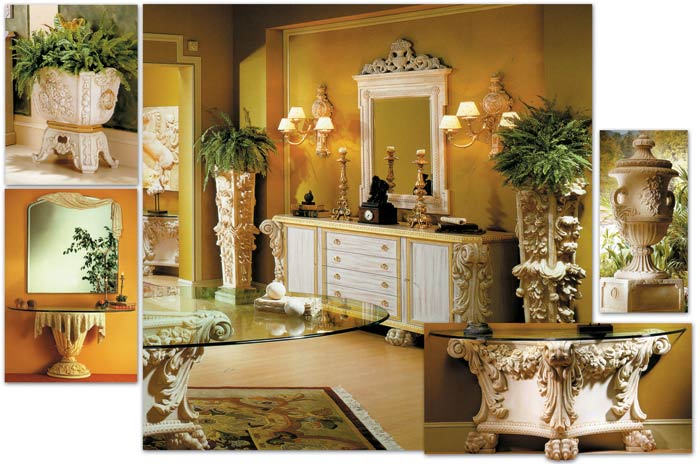 |
Using adorned and carved columns reflects a superior taste of decoration. |
And gold ornaments. All that is merely the trappings of the life of the world. But the Hereafter with your Lord is for those who are righteous. (Surat az-Zukhruf: 35) |
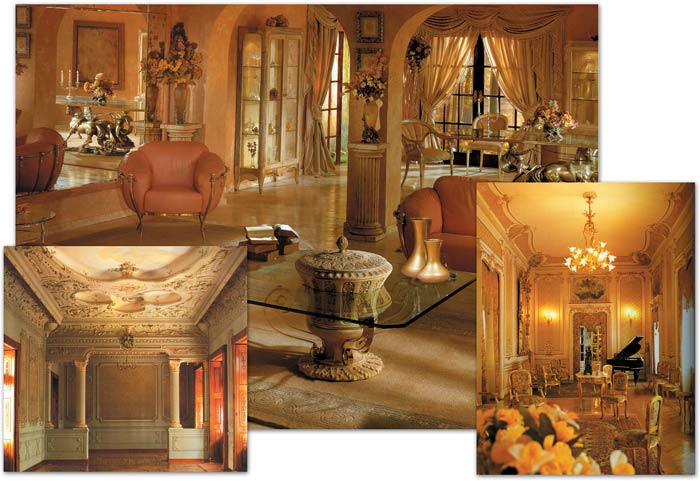 |
The believers' longing for Paradise urges them to transform their surroundings into Paradise-like places. Paradise, no doubt, abounds with works of art that are beyond our imagination. It is a place of images and beauties that are so perfect that they are unlikely to be attained in this world. Still, the Qur'anic outlook calls for using Earth's available resources to turn this world into an image of Paradise. |
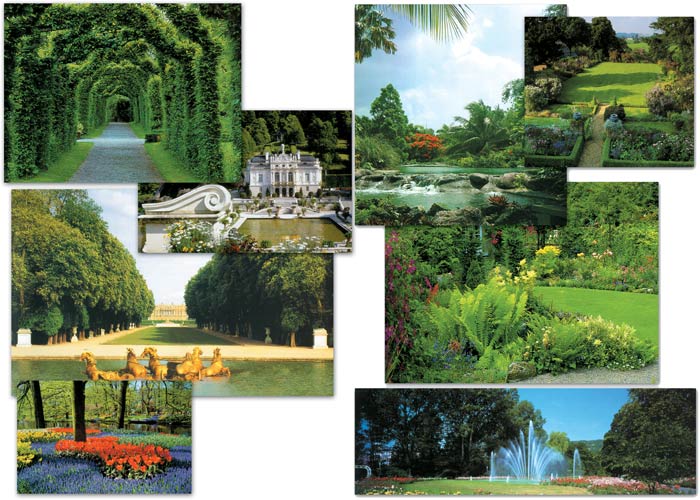 |
We place in it gardens of dates and grapes, and cause springs to gush out in it, so they may eat its fruits—they did not do it themselves. So will they not be thankful? (Surah Ya Sin: 34-35) |
In the Golden Age, decorations will convey a superior understanding of aesthetics. Be it a mansion, a garden, or a city, any place will carry the features of Paradise. |
However, in this world Allah may well present blessings beyond one's imagination. Indeed, Allah informs us that Paradise's blessings are similar to those in this world:
Give the good news to those who believe and do right actions that they will have gardens [in Paradise] with rivers flowing under them. When they are given fruit there as provision, they will say: "This is what we were given before." But they were only given a simulation of it. They will have there spouses of perfect purity and will remain there timelessly, forever. (Surat al-Baqara: 25)
The Golden Age will be the time when Allah will grant the most glorious beauties and blessings to people. To form an accurate image of this period, look at the verses that depict Paradise.
15. Muhammad ibn ‘Abd al-Rasul Barzanji , Al-Isha‘ah li-ashrat al-sa‘ah, p. 245.